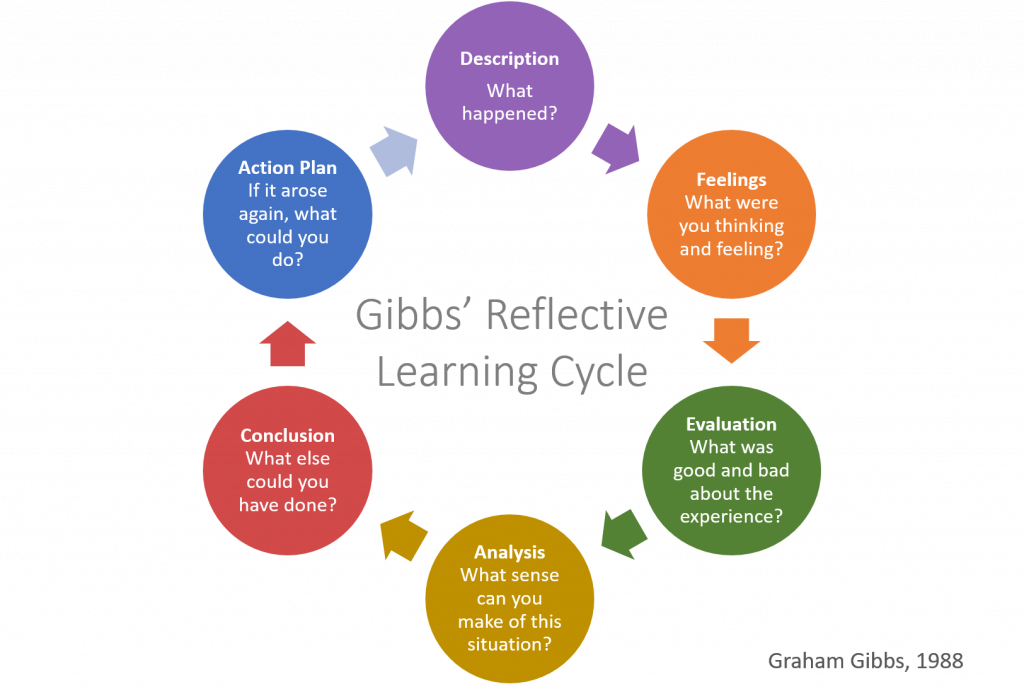Teaching to teach, or teaching to learn?

If only I could skip to the part of being a teacher who is the educational rockstar, knows what she’s doing, and has the experience behind her. Except, no, that’s not how life works. Unfortunately…

Throughout this year, I have overcome a lot of challenges in my placement, challenges which I know I will face again in later years when I’m in my own classroom, but it is how I have dealt with and learned from them that I will be able to take with me and adapt my learning, to the new challenges that I will face in the future.

I will be talking through the events and challenges that I faced this year and using Gibbs’ Reflective Cycle to reflect on my experiences, which can be seen in figure 1.
Figure 1

When I first entered the classroom back in September, I was excited but nervous about what was ahead of me, I was unsure of the challenges that I was about to face. When I first started my placement, in St Colman’s primary school, I spent time with different classes but the class that I was assigned to was Ms. Hannaway’s primary one class. I had expected to face many challenges going into primary one, the main one I had expected to face was working with different learning abilities and trying to teach small groups but with ranging learning styles and abilities. However, the primary challenge I faced was, the lack of discipline within the classroom, it was understandable why there was such a lack of discipline throughout the class. With the children having spent the majority of their life stuck at home due to the Covid-19 pandemic and missing out on their nursery experience, this was the first time for most of the children that they had ever been in a classroom environment and been such proximity with twenty-four other children. I left the classroom on my first day feeling overwhelmed and slightly out of my depth, it was a daunting first day, to say the least. The classroom on my first day is an image and chaotic memory that will remain ingrained in my brain for a long time, twenty-five children running around the classroom, some pretending to fly rockets, others playing with the princesses and ‘dress up’ and more than a few children upset with a few tearful eyes missing home.

By the end of September, the teacher had begun to enforce more of a routine for the children to follow, gradually replacing playtime with work, as the children got into a better routine, some of the discipline issues were ironed out, whilst others remained. I spent my first few weeks shadowing the teacher, watching how she spoke to the class in general and for individual issues how she spent time speaking to the pupil individually, finding out the reasoning behind it, making notes on what happened to see if there is a repeated pattern and using the ‘quiet corner.’ These are all methods of dealing with discipline that I read about. “Classroom management is a critical skill area,”[1] although you can’t control behaviour issues in the classroom, you can manage them, by setting classroom code of conduct together, the pupils are then aware of acceptable and unacceptable behaviours. “Routines are so crucial for supporting behaviour in early settings, they give children a feeling of security,”[2] having a set routine can calm children’s emotions, they know what they should be doing and know what will come next. A routine and class rules were implemented throughout the first month, the teacher and class all sat in a circle and spoke about what was expected from them – using kind hands, nice words, sharing with friends. All of the ideas that both the children and teacher came up with are displayed over the classroom, through words and pictures, just by looking around the classroom, the children are aware of what is expected of them.
Once a more structured routine was introduced and the children knew what to expect each day, the lack of discipline was reduced, however, there was still the occasional outburst. From watching and observing from my first few weeks, with confidence and using my initiative, I can deal with new and arising situations professionally. Speaking to the child and finding out what the problem is and where it’s coming from, talking to them individually, rather than shouting at them in front of a class and explaining to them how they can deal with situations, will help them and won’t be intimidating as for them as other approaches may be, this method will result in a more passive and less disruptive classroom environment.

In conclusion, looking back on how I dealt with the difficult situations, I feel that I could have intervened earlier, rather than waiting and watching. I shouldn’t have been as hesitant, as a teacher I need to be able to adapt to new and ongoing situations, this is something I do now in the classroom but should have used these characteristics and traits earlier on in the year.
From my experience on placement, I have learned a lot not only on how to deal with the behavioural challenges in the classroom but also the other challenges I’ve faced throughout this year are vast and varied including working with children who suffer from autism to working with groups of children with different ranges in abilities. All of these challenges and difficulties that I have learned from will help me and stand by me in the future when I gain my teaching qualification and have my own classroom.
Bibliography
www.google.com. (n.d.). teacher quotes – Google Search. [online] Available at: https://www.google.com/search?q=teacher+quotes&rlz=1C1ONGR_en-GBGB945GB945&sxsrf=APq-WBtdhuDdZOu2icIR1GJqKQMu9ihkUA:1648048625751&source=lnms&tbm=isch&sa=X&ved=2ahUKEwjq_KPHw9z2AhVYi1wKHUioCWUQ_AUoAXoECAEQAw&biw=1536&bih=754&dpr=1.25#imgrc=61zpXiq_RdBsbM [Accessed 19 Mar. 2022].
kidadl.com. (n.d.). 80 Quotes About Overcoming Obstacles To Help You Tackle Life. [online] Available at: https://kidadl.com/articles/quotes-about-overcoming-obstacles-to-help-you-tackle-life.
MindTools (2009). Gibbs’ Reflective Cycle Helping People Learn From Experience. [online] Mindtools.com. Available at: https://www.mindtools.com/pages/article/reflective-cycle.htm.
www.dreamstime.com. (n.d.). Students Driving The Teacher Crazy Stock Image – Image of class, concerned: 58126527. [online] Available at: https://www.dreamstime.com/stock-photo-students-driving-teacher-crazy-elementary-school-image58126527 [Accessed 20 Mar. 2022].
Collier, E. (2018). How to Deal with Challenging Behaviour in the… [online] The Hub | High Speed Training. Available at: https://www.highspeedtraining.co.uk/hub/challenging-behaviour-in-the-classroom/.
Bennett, T. (2012). Teacher: Mastering the Art and Craft of Teaching. [online] Google Books. Bloomsbury Publishing. Available at: https://books.google.co.uk/books?hl=en&lr=&id=PGESBwAAQBAJ&oi=fnd&pg=PA1&dq=Bennett [Accessed 18 Mar. 2022].
Simonsen, B., Fairbanks, S., Briesch, A., Myers, D. and Sugai, G. (2008). Evidence-based Practices in Classroom Management: Considerations for Research to Practice. Education and Treatment of Children, [online] 31(3), pp.351–380. Available at: https://www.jstor.org/stable/pdf/42899983.pdf?refreqid=fastly-default%3A02b970e11891238b57f9f22e4649a094&ab_segments=0%2Fbasic_search_gsv2%2Fcontrol&origin=search-results [Accessed 19 Mar. 2022].
Media (2000), M. (n.d.). How Routines Can Improve Behaviour in Early Years Settings | A Unique Child. [online] Teach Early Years. Available at: https://www.teachearlyyears.com/a-unique-child/view/stick-to-the-schedule.
www.stcolmanslambeg.com. (n.d.). Welcome | St Colman’s Primary School. [online] Available at: https://www.stcolmanslambeg.com/welcome/ [Accessed 20 Mar. 2022].
[1] Simonsen et al., 2008
[2] Media, 2000


